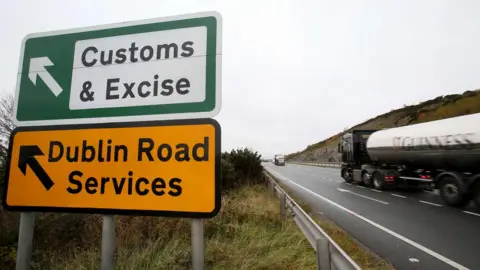'Not all exports can comply with new post-Brexit rules'
 AFP
AFPNot all exporters will be able to comply with new rules after Brexit, according to the department responsible for agri-food cross border trade.
The Executive Department has said the best thing companies can do is prepare for change.
Companies without the paperwork required by the EU will not be able to sell their produce there.
The Department of Agriculture said it expects the pattern of trade to change.
"The best thing agri-food businesses can do is to prepare for these changes - as not all businesses will be able to meet the new Export Health Certificate requirements," it said.
It's estimated that up to 1.9m such certificates will be needed to accompany every consignment of locally produced food and other animal products bound for the EU.

What are EHCs?
An EHC is an official document that confirms a food or animal export meets the health and quality requirements of the importing country.
The EHC has to be signed by a vet or other qualified person in the exporting country after they have inspected the goods.
Food products being imported into the EU from a non-member state require EHCs.
They're signed by vets to assure the importing country that produce is safe and without them trade can't happen.
Around 18,000 of them a year are currently produced in Northern Ireland mostly to cover the trade in live animals to Britain.
Read more here.

'It will kill off trade'
Northern Ireland is heavily reliant on agri-food and while Britain is by far the biggest market, cross-border business is hugely important.
An agri-food representative says a lack of vets to sign paperwork could effectively halt much of Northern Ireland's cross-border export trade in the event of a no-deal Brexit.
Peter Hardwick is a trade specialist with the British Meat Processors' Association.
He says he does not believe Northern Ireland has enough vets to sign all the paperwork that would be needed.
"I simply don't think that the resource is there to deal with that and effectively I think that will kill off a great part of that trade."
The EU's Export Health Certificates set the rules by which they'll accept imports and the conditions of some can be onerous for non-EU countries.
Mr Hardwick said it was possible the UK could cut a deal that would see it follow the EU's rules for a period after Brexit, allowing trade to continue while a permanent arrangement was worked out.
But he said that would not get around the need for a huge number of trade certificates.
He said if firms did not have the certificates they could not export and competitors inside the EU would be quick to capitalise.
"I think you have to draw the obvious conclusion that you can't do the business, that you will lose that business.
"There will be competitors in the EU who are no doubt chomping at the bit, who don't have to jump through those hoops and they'll be in a prime position to take it away from us."
DAERA says it is recruiting new staff and retraining existing ones to cope with the new trading arrangements.
"While we anticipate that current trade will adjust, it is difficult to gauge demand for certification as businesses may not make decisions until post Brexit. We are currently assessing the resources available and how we will prioritise based on the potential scale of the demands."
It is encouraging businesses to sign up to advice workshops it's beginning to run from next week.
